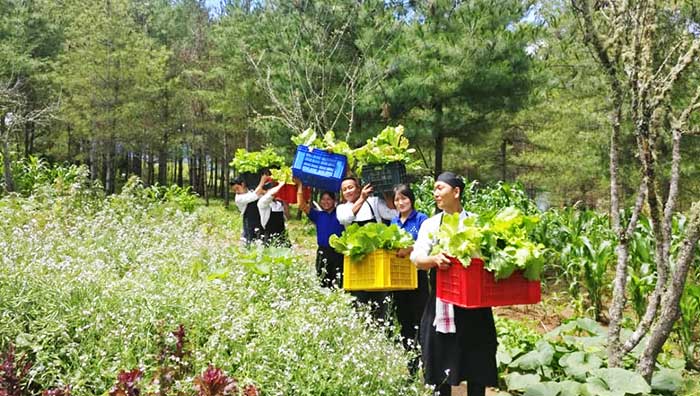Choki Wangmo
As businesses in the service sector plummeted in Covid-19’s wake, Bhutanese are turning to agriculture again.
The country is more focused than ever on the security of the food supply chain that many laid-off workers now want to keep farming even if the current situation improves.
As of yesterday, 17 groups of laid-off workers applied for technical and land development support from the Thimphu dzongkhag. Most of the applicants were hotel owners who wanted to engage their workers on 106.4 acres of private fallow land.
More than a month ago, a tour guide Chimmi Dema was jobless after the government enforced tourist restriction. Along with seven other tour guides, she started vegetable cultivation on a two-acre land.
After three weeks of land development activities with the help of the agriculture department, they cultivated vegetables such as tomato, cabbage, carrot, beans and chilli.
Chimmi Dema and her team want to cultivate in the future. “Tourists are seasonal, and we can work on vegetable production during the lean season. Growing organic food has become more important and precious.” She hopes that her farming experience would make her a better tour guide. “I can use this experience to share Bhutan with the guests,” she said.
In the same group, Kishor Kumar Thapa said that coming together on the farm had taught him essential skills. “The pandemic impact might take years to cool off. I want to work on the farm and grow vegetables.”
A tour company, Bridge to Bhutan has employed their staff in vegetable cultivation at Sangaygang on their private land. The team has built a greenhouse and a nursery. In the next few days, they will transplant the sapling in more than an acre land in Kabesa.
The founder of the company, Phuentsho Norbu, said that the company had plans to start vegetable cultivation before the pandemic, but it couldn’t materialise. The company wants to continue the farming practice and involve friends and family members of its staff.
“Farming is closely related to tourism. In the past, when I said Bhutan is 100 percent organic, I was not so confident. Now, I can proudly say we are organic through the first-hand experience,” Phuentsho Norbu said, adding that the company is exploring ways to develop agri-tours for the guests in the future.
“Agriculture is the way forward, and we can be self-reliant, although it is a long-term investment. The hotels can buy from local vendors instead of importing,” he added.
The Six Senses hotel branch in Paro has also employed half of their 90 staff in large-scale cultivation of fruits, grains and vegetables. The hotel is paying 70 percent of the salary as of now. The lodge manager, Roy Podemann, said that most of the staff came from a farming family but had no experience. “Everyone is learning the skills now.”
The farm products will be distributed among employers, monasteries, visually-impaired school in Drugyel and at the hotel for guests. “We can share our experiences with our guests in the future and maybe involve them even.”
“It is possible to grow our food which is nutritious and organic.”
Recently, the agriculture department, in collaboration with Thimphu dzongkhag leased 21.81 acres of land to laid-off workers in the dzongkhag.
Yesterday, the agriculture department in consultation with the Tourism Council of Bhutan allocated plots to 24 tour guides divided into four groups who will kick start the commercial farming project soon.
Agriculture Minister Yeshey Penjor said that the ministry would support interested individuals and groups in farming even after the pandemic. Lyonpo said that the ministry was worried that the groups would leave cultivation halfway after the department’s investments in land development and farm inputs.
“The ministry would provide CSI loans at a reduced interest rate, land resurfacing and development support and direct inputs such as seeds, electric fences and technical support. If the interested individuals and groups can continue in the future, it is a move towards achieving nation’s food security goals” Lyonpo said.
He said that people requested for fallow land in Thimphu and Paro, which was not possible.
The ministry and dzongkhag agriculture officers help the agricultural groups with protected cultivation technology like polytunnel, polyhouse, irrigation, farm mechanisation, and terracing, among others.
Thimphu Dzongkhag agriculture officer, Sonam Zangpo, said cultivation would be in full swing next month.
Improving agricultural market facilities are among the reprioritised activities of the 12th Plan.


